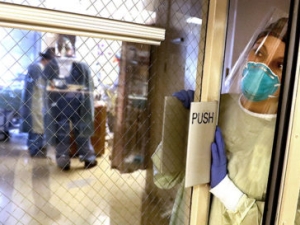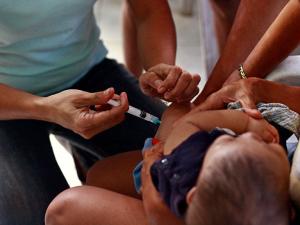

Research Bio
Joseph Lewnard studies the transmission dynamics of infectious disease agents and the effectiveness of interventions such as vaccination and antimicrobial therapies. His work addresses viral (e.g., SARS-CoV-2, RSV, influenza) and bacterial (e.g., Streptococcus pneumoniae, Group A Streptococcus) pathogens of the respiratory tract, as well as antimicrobial resistance in community-acquired and healthcare-acquired infections.
Research Expertise and Interest
infectious diseases, antimicrobial resistance, public health surveillance, mathematical modeling, Bayesian inference
In the News
New Lancet Series: 750,000 Deaths Linked to Antimicrobial Resistance Could be Prevented Every Year
Authors say that, without action, the world will see a steady increase of deaths linked to antimicrobial resistance.
UC Berkeley Partners With Kaiser Permanente To Launch the California Center for Outbreak Readiness
UC Berkeley School of Public Health and Kaiser Permanente Southern California are launching a new center to develop advanced modeling methods to address disease outbreaks and prepare the nation for future pandemics.
Drought Exacerbates Emerging Infectious Disease in California: Berkeley Study
Researchers at UC Berkeley have discovered a pronounced role of California’s recent droughts in driving the transmission of Valley fever in the state.
California farmworkers hit hard by COVID-19, study finds
Many farmworkers who plant and harvest our food are forced to live and work under conditions that are ripe for transmission of COVID-19. During the summer harvest season, coronavirus outbreaks popped up across the nation among farmworkers in agricultural communities, including many in California.
Long hospital stays, high rates of ICU admission for U.S. COVID-19 patients
Hospitalized COVID-19 patients in the U.S. are enduring longer hospital stays and facing higher rates of intensive care unit (ICU) admission than patients in China, finds a new study led by researchers at the University of California, Berkeley, and Kaiser Permanente.
To prevent antimicrobial resistance, vaccinate the world’s kids
Childhood vaccination may be a powerful tool in the fight against antimicrobial resistance in low- and middle-income countries, finds a new analysis led by researchers University of California, Berkeley.
Featured in the Media
Please note: The views and opinions expressed in these articles are those of the authors and do not necessarily reflect the official policy or positions of UC Berkeley.
January 11, 2022
A new study of nearly 70,000 Covid patients in California demonstrates that Omicron causes less severe disease than other coronavirus variants.
The new research, posted online Tuesday, aligns with similar findings from South Africa, Britain and Denmark, as well as a host of experiments on animals. "It's truly a viral factor that accounts for reduced severity," said Joseph Lewnard, an epidemiologist at the University of California, Berkeley, and an author of the study, which has not yet been published in a scientific journal.
Compared with Delta, Omicron infections were half as likely to send people to the hospital. Out of more than 52,000 Omicron patients identified from electronic medical records of Kaiser Permanente of Southern California, a large health system, Dr. Lewnard and his colleagues found that not a single patient went on a ventilator during that time.
The new research, posted online Tuesday, aligns with similar findings from South Africa, Britain and Denmark, as well as a host of experiments on animals. "It's truly a viral factor that accounts for reduced severity," said Joseph Lewnard, an epidemiologist at the University of California, Berkeley, and an author of the study, which has not yet been published in a scientific journal.
Compared with Delta, Omicron infections were half as likely to send people to the hospital. Out of more than 52,000 Omicron patients identified from electronic medical records of Kaiser Permanente of Southern California, a large health system, Dr. Lewnard and his colleagues found that not a single patient went on a ventilator during that time.
October 1, 2020
A UC Berkeley study has found several surprising insights on how COVID-19 is affecting India, a country of 1.3 billion people. The median hospital stay before death from the virus was five days, compared with two weeks in the United States, possibly because of limited access to health care. The trend in increasing deaths with age seemed to drop off after age 65, perhaps because Indians who live past that age tend to be relatively wealthy and have access to good health care. The study also found that children of all ages can become infected and spread the virus to others. An overwhelming majority of coronavirus cases globally have occurred in resource-poor countries, noted Joseph Lewnard, an epidemiologist at the University of California, Berkeley, who led the study. But most of the data has come from high-income countries. "It still surprises me that it took until this point for a lot of data to come out of a low- or middle-income country about the epidemiology of Covid," he said.
FullStory (*requires registration)
May 27, 2020
COVID-19 patients treated at Kaiser facilities in California and Washington have been requiring longer hospital stays and are more likely to need intensive care than patients in China, according to a new analysis conducted by Berkeley researchers and Kaiser Permanente. The findings indicate that the burden the crisis has placed on U.S. hospitals may have been higher. "The hospital resources needed to meet the needs of severely ill patients are substantial," says assistant public health and epidemiology professor Joseph Lewnard, the paper's lead author. "We found that observations from China may not provide a sufficient basis for anticipating the U.S. health care demand." For more on this, see our press release at Berkeley News. Stories on this topic have appeared in dozens of sources, including CBS Bay Area Online, News Medical, California EPeak.
FullStory (*requires registration)
Loading Class list ...






